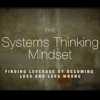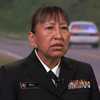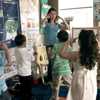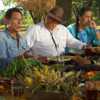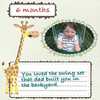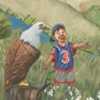Life Stages & Populations Videos
The Value of Systems Thinking (10:09)
This video provides an overview of why systems thinking is important and what it means to apply it. It describes why our traditional way of thinking may thwart achieving our intended results or unintentionally create worse issues than the ones we’re trying to address.
A Killer in Indian Country (4:15)
The sad reality is that American Indian and Alaska Natives use seat belts and child safety seats less often and are involved in more alcohol-related crashes than any other group in the US. The video features the CDC Director, a crash survivor and Indian Health Service expert speaking about how to stay safe on the road by wearing seat belts whenever you’re in the car, making sure that young children are in a car safety seat that’s the right size for their age and weight and choosing never to drink and drive.
Baby Steps: Learn the Signs. Act Early. (4:32)
Early recognition of developmental disabilities such as autism is key for parents and providers. CDC realized the impact on families and invested in a campaign to help parents measure their children’s progress by monitoring how they play, learn, speak and act.
Dangerous Creatures – A Visit To The CDC Insectary (5:48)
This video for young people ages 8 to 12, takes viewers to CDC′s insectary, where they learn from CDC researchers about mosquitoes and malaria. See how mosquitoes are bred and used in tests to determine if they are becoming resistant to the insecticides used in nets and spray to prevent malaria. CDC’s malaria expertise and global partnerships have helped save millions of children’s lives.
Making Health Easier: Healthy Changes Start in Preschool (3:54)
The video highlights the efforts of one educational organization, Los Angeles Universal Preschool (LAUP), to keep kids healthy at an early age. Childhood obesity now affects approximately one in six kids and disproportionately affects low-income and minority populations. LAUP teaches kids healthy habits and is incorporating small, healthy changes that can be made in any classroom—like teaching fun dances and providing nutritious snacks.
Other versions:
Our Cultures Are Our Source of Health (9:02)
Renowned Hollywood actor and Cherokee tribal member, Wes Studi, explains how American Indians and Alaska Natives are twice as likely to have diagnosed diabetes as non-Hispanic whites. Studi underscores the wisdom of cultural knowledge, including gathering and planting local traditional foods and playing traditional games, to promote health and prevent diseases like type 2 diabetes. In the dramatic short video, Studi relays the powerful message: “Our people and cultures hold the answers. Our cultures are our source of health.”
Other versions:
Take 3 (:60)
Wes Studi, Hollywood actor and Cherokee tribal member, urges American Indians and Alaska Natives to “Take 3” as the best way to protect themselves, their families and their tribal communities from flu and the H1N1 virus: get vaccinated, prevent the spread of germs and take antivirals when prescribed.
A Message to Health Care Professionals: Teen Pregnancy (2:34)
The video features teens who speak out about how decreasing unintended pregnancy rates in the United States are still too high as every day over a thousand babies are born to teen mothers. Teens urge health care professionals across the nation to talk to their teen patients about pregnancy and contraception to help improve the lives of all young people.
The Immunization Baby Book (4:16)
For parents there’s no greater joy then watching your child grow up happy and healthy. That’s why most parents choose the safe, proven protection of vaccines. Flipping through this baby book, you can learn what vaccines babies need, when they’re needed, and why it’s so important to follow CDC’s recommended immunization schedule. Immunization gives you the power to protect your baby from 14 serious childhood diseases by age 2. For more information about vaccines, visit For Parents: Vaccines for Your Children.
The Story of Folic Acid Fortification (6:37)
The video documents the compelling story of how Folic Acid fortification has become a staple in the lives of women of child-bearing age everywhere to protect their babies from developing major birth defects such as spina bifida and anencephaly that are either fatal or have serious, long-term consequences for the child. The documentary short chronicles how spina bifida F could be the next major health problem eradicated after smallpox and polio.
Through the Eyes of the Eagle (6:36)
Introduces the characters of Mr. Eagle and Rain That Dances, the American Indian boy he befriends. Mr. Eagle reminds the young boy of the healthy ways and wisdom of his elders.
Wes Studi: Don’t Get Don’t Spread (:60)
Wes Studi, Hollywood actor and Cherokee tribal member, expresses concern about the higher threat that H1N1 flu poses to American Indians and Alaska Natives for hospitalization and severe problems. Studi advises Native people to get vaccinated to protect themselves, their families and their communities from influenza.
Wes Studi: Seasonal Flu (:60)
Wes Studi, Hollywood actor and Cherokee tribal member, explains how American Indians and Alaska Natives are at risk for the flu. Mr. Studi reaches out to tribal communities and offers ways to prevent the spread of flu and protect the circle of life.
Wes Studi: Signs (:60)
Wes Studi, Hollywood actor and Cherokee tribal member, expresses concern for American Indians and Alaska Natives by detailing the symptoms of flu and emergency warning signs for children and adults and urges them to seek medical care right away if ill to recover from flu.
Other versions:
Related Videos
- A Key Piece of the Puzzle: Vaccinations (:60)
- Babies on the Move: Protecting Babies with Vaccination (:60)
- Get The Picture: Childhood Immunizations (6:27)
- Jamie Foxx Talks About HIV (1:05)
- Knees Lifted High (7:36)
- Me? Have a baby? Preconception Health (1:58)
- Me? Have another baby? Preconception Health (2:15)
Send Us Feedback
What do you think of our videos? Your feedback about CDC-TV and our videos is very important to us. Send us a comment about our videos.
- Page last reviewed: March 30, 2017
- Page last updated: March 30, 2017
- Content source:
- Centers for Disease Control and Prevention
- Page maintained by: Office of Associate Director of Communication, Division of Public Affairs


 ShareCompartir
ShareCompartir
